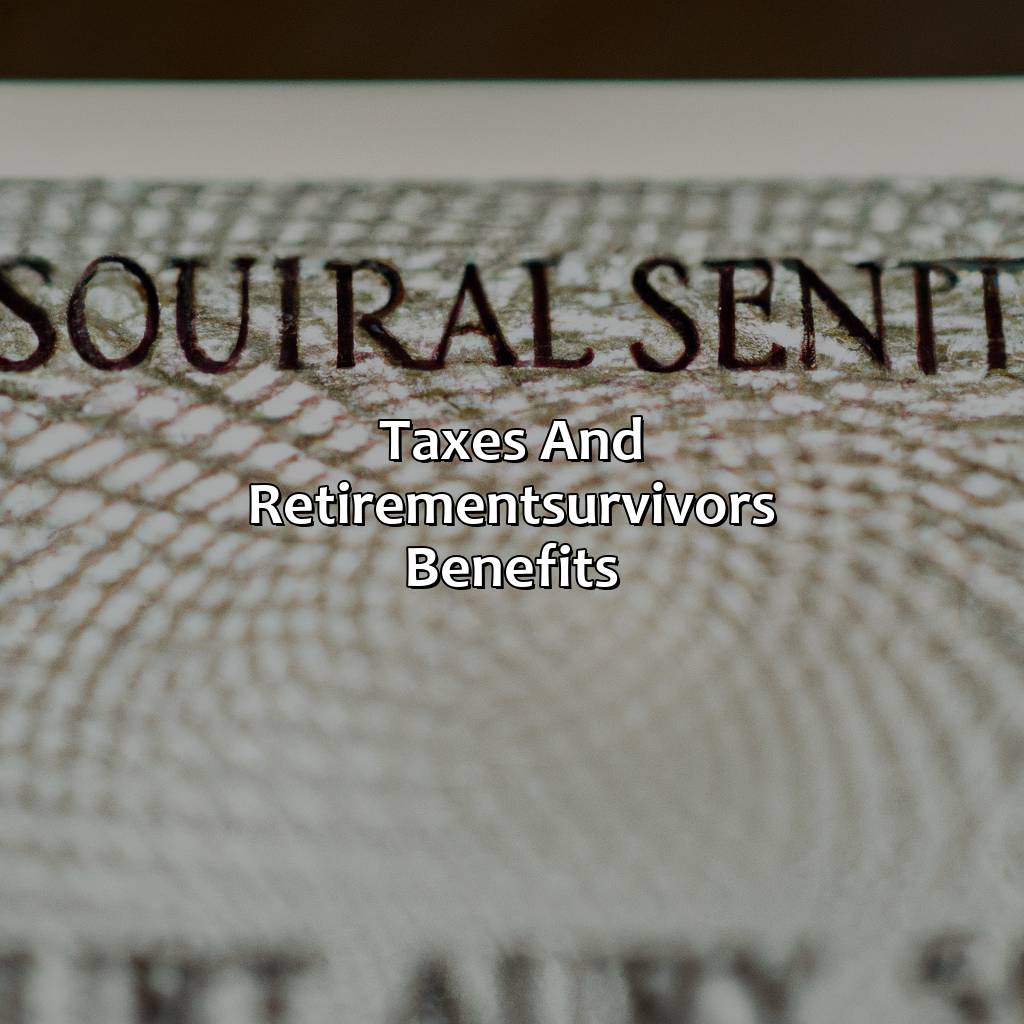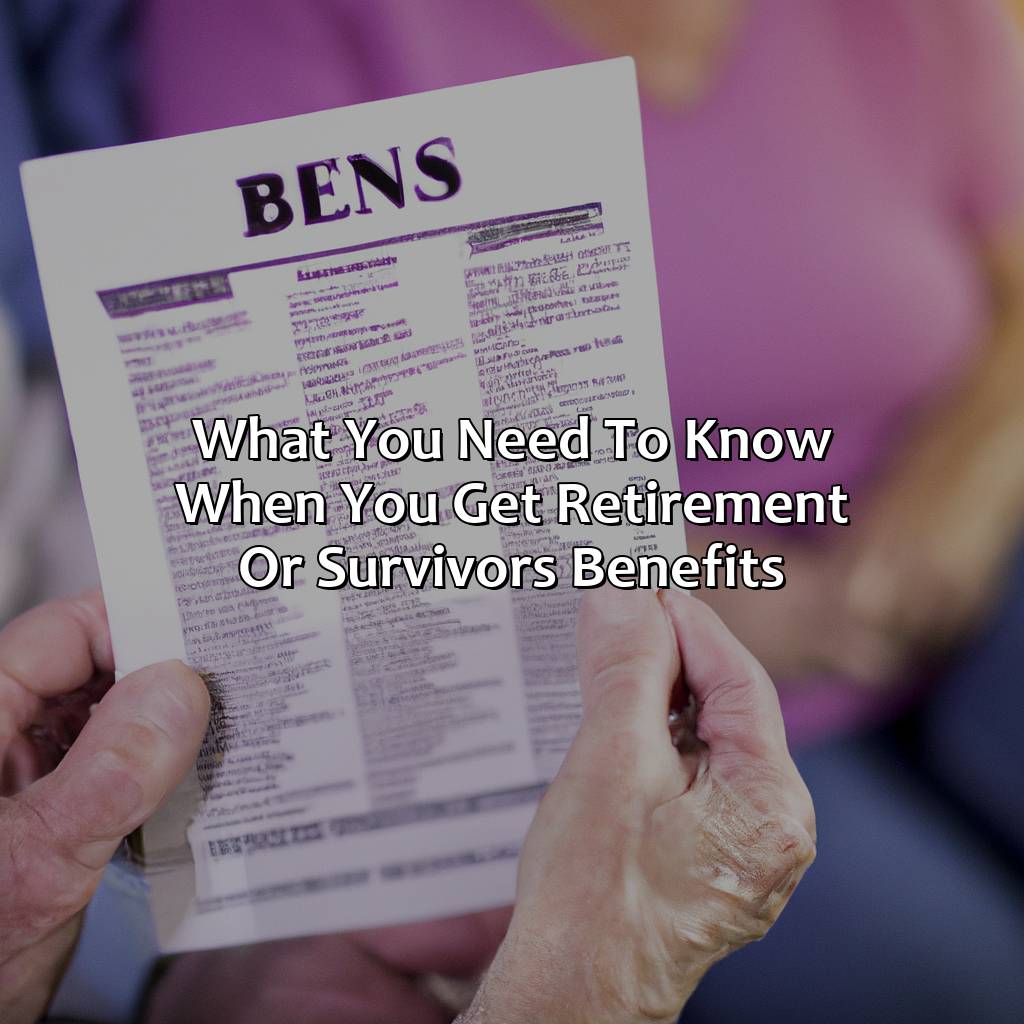What You Need To Know When You Get Retirement Or Survivors Benefits?
Key Takeaway:
- Retirement benefits have specific eligibility criteria: To receive retirement benefits, you need to have worked for a certain amount of time and contributed a certain amount to social security. Additionally, you must be of a certain age to start receiving benefits.
- There are different types of retirement benefits: Social Security provides several different types of benefits, including retirement benefits for the worker, spousal benefits, and survivor benefits. Each type has its own rules and eligibility criteria.
- Applying for retirement and survivor benefits requires careful consideration: To receive retirement or survivor benefits, you need to file an application with social security. It’s important to carefully consider the timing of your application, as starting benefits too early or too late can have an impact on the amount of benefits you receive.
Are you worried about getting the most out of your retirement or survivors benefits? You’ll find the answers you need here. Get informed and secure your future with the latest information and resources.
Retirement Benefits
Know the criteria to be eligible for retirement benefits. Learn about different types of them. Understand how to apply for them. This guide will give you a thorough knowledge about retirement benefits. Get ready for your retirement!

Image credits: retiregenz.com by Yuval Arnold
Eligibility Criteria
You may be eligible for retirement or survivors benefits if you meet specific criteria set by the Social Security Administration.
To qualify, you must have earned enough work credits through employment covered under the Social Security system and have reached a certain age or had a spouse who qualified for benefits. Additionally, disabilities and certain medical conditions may also make you eligible.
It is important to note that eligibility requirements can vary based on individual circumstances such as the type of benefit being applied for and family history.
To ensure eligibility, it is recommended that individuals keep track of their earnings records and review them annually to catch any errors or missing information. It is also advisable to consult with a Social Security representative or financial advisor to maximize benefits.
By fulfilling the eligibility criteria and staying informed about changes in policy, individuals can ensure they receive the retirement or survivors benefits they are entitled to.
Don’t worry, there’s a retirement benefit for every type of retiree – even for those who spent their whole career avoiding work like it was the plague.
Types of Retirement Benefits
Retirement Benefits come in various types to meet the needs of retirees. Here are some types that you may be eligible for:
- Social Security Retirement Benefits
- Railroad Retirement Benefits
- Government Employee Pension Benefits
- Private Employer Pension Plans
Social Security provides retirement benefits, disability benefits, and survivor benefits. Railroad Retirement provides retirement, survivor, and disability benefits for railroad employees who worked in covered employment. Government Employee Pension Plan provides a benefit based on your years of service and final average pay or highest rate of pay attained. Private Employer Pension Plans provide a pension plan benefit based on company policies.
Additional details about each type of retirement benefit can be found on their respective websites or by contacting their customer service lines directly.
To ensure you receive the maximum amount of retirement income, consider delaying your retirement or working part-time during your retirement years. You may also hire a financial planner who can help you create a plan that best fits your financial situation and goals. By understanding the different types of retirement benefits available to you and planning accordingly, you can make the most out of your golden years.
Ready to apply for retirement benefits? It’s like online shopping, but instead of a fancy new outfit, you get a steady stream of income until you die!
How to Apply for Retirement Benefits
When it comes to receiving your Retirement Benefits, the application process can be simple if you are well-informed. The following guide will provide a step-by-step approach on how to apply for your Retirement Benefits effectively:
- Determine your eligibility by checking if you have reached the minimum age requirement.
- Collect and prepare required documents such as birth certificate and social security statement.
- Apply for Retirement Benefits online or in-person at a Social Security office near you.
- Review and confirm all information provided is accurate.
- Await confirmation of approval and potential follow-up requests from the Social Security Administration (SSA).
- Start receiving your retirement benefits once approved!
It is important to note that the approval process may take time, but persistence and proper documentation can lead to a smooth and successful outcome.
Additionally, it is crucial to understand that applying for Survivor’s Benefits may differ from applying solely for Retirement Benefits. Be sure to review eligibility requirements before submitting an application.
Pro Tip: Consider consulting with a financial advisor before making any drastic decisions regarding your Retirement Benefits.
Death may be inevitable, but at least your loved ones can benefit from your Social Security contributions with survivor’s benefits.
Survivors Benefits
Find out more about the Survivors Benefits section in “What You Need to Know When You Get Retirement or Survivors Benefits.” Learn the eligibility criteria, types of survivors benefits, and how to apply. See which criteria must be met to qualify. Check the different types of benefits available. Discover how to begin the application process.

Image credits: retiregenz.com by Yuval Arnold
Eligibility Criteria
To qualify for retirement or survivors benefits, certain criteria must be met. These criteria may include age, work history, and relationship to the deceased or retired worker. Additionally, specific requirements may vary depending on the type of benefit being sought and the circumstances surrounding the individual’s claim.
When applying for benefits, individuals should be prepared to provide documentation to support their eligibility. This documentation can include birth certificates, marriage licenses, and social security numbers for all parties involved. It is also important to note that benefits may be reduced or withheld if the individual has other sources of income or if they are subject to certain penalties.
Furthermore, it is crucial to meet specific deadlines when applying for benefits. Failure to do so could result in a loss of potential payments. For more detailed information on eligibility criteria for retirement or survivors benefits, consult with Social Security Administration resources or contact a qualified professional.
A woman who lost her husband recently found herself struggling financially while dealing with grief. Fortunately, she was able to apply for survivors benefits and receive regular payments that helped alleviate some financial strain during this difficult time.
Even in death, you can still provide for your loved ones – just make sure you understand the different types of survivors benefits.
Types of Survivors Benefits
Survivors Benefits refer to the benefits that a surviving family member of a deceased worker can claim from the Social Security Administration. Below are some benefits that beneficiaries may be eligible for when a loved one dies:
- Death Benefits: A one-time payment of $255 may be available to the surviving spouse or children.
- Survivor’s Benefit: Surviving spouses can claim up to 100% of the deceased worker’s benefit amount, depending on their age and other factors.
- Child Benefits: Children under 18, dependent parents, or disabled children may also be eligible to receive benefits based on the deceased worker’s record.
In addition, survivors who receive benefits due to early retirement will receive permanent reductions in their payments when they reach full retirement age.
It is essential for survivors to report the death of a loved one as soon as possible so that they do not miss any potential benefits. The SSA will need information such as death certificates, marriage licenses, and custody documents (for child beneficiaries). Seeking help from an attorney could also provide additional guidance on how to secure all eligible survivor’s benefits. Applying for survivors benefits is like submitting a resume for a job you don’t really want, but desperately need.
How to Apply for Survivors Benefits
When considering applying for Survivors Benefits, there are several steps to follow to ensure a successful application process. Here is what you need to know:
- Determine eligibility by checking the Social Security website and gathering necessary documentation like a birth certificate, marriage license, and death certificate.
- Apply as soon as possible by visiting the Social Security office or applying online.
- Be prepared to provide information about yourself and the deceased.
It’s important to note that each situation is unique, and requirements may vary based on individual circumstances, such as age or disability. Ensure that all required documentation is provided promptly for the quickest possible result.
Did you know that once you start receiving survivors benefits, you may also be eligible for other Social Security benefits, such as retirement or disability benefits? It’s worth exploring all options available.
In 1939, Frances Perkins became America’s first female cabinet member when she was appointed Secretary of Labor under FDR’s administration. She played a pivotal role in creating survivors benefits as part of the Social Security Act of 1935—providing financial security for families during difficult times.
Whoever said ‘nothing is certain except death and taxes’ clearly forgot about retirement and survivors benefits.
Taxes and Retirement/Survivors Benefits
Many people do not know how taxes affect their retirement or survivors benefits. Understanding the tax implications is important to avoid overpaying or underpaying taxes. The amount of taxes you pay on your benefits can vary based on your income, filing status, and the type of benefit you are receiving.
Retirement and survivors benefits are subject to federal income tax. If you receive a certain amount of income from sources other than your benefits, such as wages or investment income, you may have to pay taxes on your benefits. However, if your only income is from Social Security, you may not have to pay any federal income tax on your benefits.
It is important to note that some states also tax Social Security benefits, while others do not. It is important to check with your state’s tax authority to understand whether you will be taxed on your benefits. Additionally, there are several tax credits and deductions that may be available to you to reduce your tax liability on your benefits.
Did you know that up to 85% of your Social Security benefits can be subject to federal income tax? This information comes from the Social Security Administration.

Image credits: retiregenz.com by Harry Woodhock
Five Facts About Retirement and Survivors Benefits:
Retirement benefits are available to individuals who have reached full retirement age or have become disabled. (Source: Social Security Administration)
Survivors benefits can be paid to eligible family members of a deceased worker. (Source: Social Security Administration)
The amount of benefits received is based on the worker’s lifetime earnings record. (Source: AARP)
Benefits are adjusted annually for inflation. (Source: Social Security Administration)
It is important to plan ahead and consider factors such as life expectancy and retirement savings when deciding when to start receiving benefits. (Source: CNBC)
FAQs about What You Need To Know When You Get Retirement Or Survivors Benefits?
What are retirement or survivors benefits?
Retirement benefits are payments made to eligible workers who have reached a certain age and have paid social security taxes for a required period. Survivors’ benefits are paid to the families of eligible workers who have passed away.
What do I need to do to qualify for retirement benefits?
To qualify for retirement benefits, you must have worked and paid social security taxes for at least 10 years. You must also be at least 62 years old to start receiving benefits.
What do I need to do to qualify for survivors benefits?
To qualify for survivors benefits, you must be the spouse, child, or parent of a deceased worker who has worked and paid social security taxes for a certain amount of time. The deceased worker’s earnings must also have reached a minimum amount.
When should I apply for retirement or survivors benefits?
You should apply for retirement or survivors benefits at least three months before you want your payments to start. If you are not sure about when to apply for benefits, contact the Social Security Administration.
How are retirement benefits calculated?
The amount of your retirement benefit is based on your highest 35 years of earnings and the age at which you start receiving benefits. The Social Security Administration provides a calculator on its website to help you estimate your benefit amount.
How are survivors benefits calculated?
The amount of survivors benefits depends on the deceased worker’s earnings and the relationship between the survivor and the worker. The Social Security Administration provides a calculator on its website to help survivors estimate their benefit amount.
 Checkout this IRS Loophole
Checkout this IRS Loophole 





